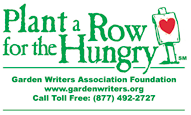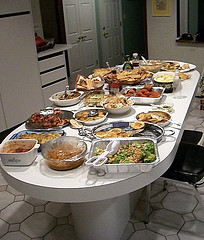Leftovers Edition
There are only two days left of the SNAP to it Food Stamp Challenge, and it looks like I’m going to make it just barely under budget. We still have a lot of food left in the pantry, so I think it will be about an even swap out in terms of how we started out except that there is no meat in the freezer (just lots of black bean and tomato cornbread and soup stock). In retrospect, there are ways I think I could improve on the purchasing and planning, and I did learn a lot, but those things I’ll save until Wednesday when I wrap this thing up and give a full accounting.
Today I want to share a few odds and ends with you in hopes that you will continue this quest within your congregations, community groups, and family units. Hunger is a problem for all of us. It is my conviction that as long as one person is hungry, we are all culpable because there are enough resources on earth for everyone to be fed.
So what can you do? Here are three suggestions.
 Plant a Row for the Hungry (PAR)
Plant a Row for the Hungry (PAR)
This program was started in 1995 by the Garden Writers Association and the GWA Foundation. The idea is for everyone who plants a garden to dedicate one extra row to growing vegetables to give to soup kitchens, food banks, and hunger programs. So far over 14 million pounds of produce providing over 50 million meals has been donated through PAR. Click here for more information about PAR and how you can become involved.
 Ed Hume Seeds donates a free package of vegetable seeds each year to the first 250 people who e-mail and agree to participate in PAR. Click here for more information.
Ed Hume Seeds donates a free package of vegetable seeds each year to the first 250 people who e-mail and agree to participate in PAR. Click here for more information.
Participate in Bread for the World’s Offering of Letters
 Bread for the World is headed by David Beckmann, a Lutheran Pastor and economist who was recently named a 2010 World Food Prize Laureate. Click here to visit the web site where you will find a variety of resources and suggestions for how to be involved and make a difference. Even if SNAP is your monthly reality, you can help by contacting your elected leaders through Bread’s programs.
Bread for the World is headed by David Beckmann, a Lutheran Pastor and economist who was recently named a 2010 World Food Prize Laureate. Click here to visit the web site where you will find a variety of resources and suggestions for how to be involved and make a difference. Even if SNAP is your monthly reality, you can help by contacting your elected leaders through Bread’s programs.
Clicking for Good
![441065400_2eb10256b6_m[1]](https://www.stewardshipoflife.org/wp-content/uploads/2010/06/441065400_2eb10256b6_m11.jpg) As long as you’re surfing the web, try these two ways to help end hunger. Visit the Hunger Site each day, and click to donate a cup of food. You might even find a fair-trade gift from one of the sponsors, but there is no requirement to purchase. The donations come from sponsors and advertisers. Click here to visit.
As long as you’re surfing the web, try these two ways to help end hunger. Visit the Hunger Site each day, and click to donate a cup of food. You might even find a fair-trade gift from one of the sponsors, but there is no requirement to purchase. The donations come from sponsors and advertisers. Click here to visit.
Click here to visit Freerice.com and improve your vocabulary or try your hand at answering questions on other subjects. For each question or word you correctly answer/identify you’ll give 10 grains of rice to help feed the hungry. This is a great way to involve children and teens in a learning activity that has a great purpose.
The main point I want to make today is that we can all do something to alleviate hunger regardless of our economic standing, location, or interests. Importantly, we are all responsible for raising awareness and lifting up the need.
State of the Pantry
No purchases today! Breakfast was oatmeal with blueberries and walnuts. Lunch was leftover spinach salad and a cookie. I had tea, coffee, and water to drink. For snack I had some cherries and a Dove dark chocolate. Supper was leftover cauliflower and a burger with no bun. (We’re out of bread with the exception of a lone whole wheat tortilla.)
Websites of the Day have already been provided so I’ll recommend a book instead.
One of the best books about thrift that I’ve ever read is Doris Janzen Longacre’s Living More with Less. You may also know her as the author of the More-With-Less Cookbook. This book is packed with a wealth of tips and ideas AND reasons for consuming less.
Photo Credit: MoToMo though a Creative Commons License. Thanks!




Leave a Reply